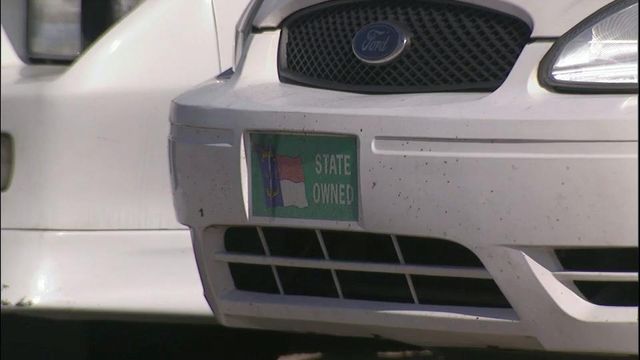GPS study finds waste, speed in state motor fleet
A study released Monday using GPS telemetry in a sampling of state-owned vehicles shows many aren't being used on a regular basis - and others are being used in ways that diminish fuel efficiency.
Posted — UpdatedThe study was presented to the Joint Program Evaluation Oversight panel Monday by Verizon Telematics, one of four vendors seeking a state contract to run monitoring software on all state-owned vehicles.
The pilot project monitored the use of 76 state cars over a seven-month period thus far. It's expected to run through the summer.
Although it's a small sampling of the state's 33,000-vehicle motor fleet, study authors say the sample vehicles were spread among the five agencies that account for nearly three-quarters of the state fleet: the Departments of Administration, Transportation and Health and Human Services, as well as North Carolina State University and the University of North Carolina at Chapel Hill.
The data showed that 6.39 percent of the vehicles in the sample pool sat unused for at least one month out of the pilot period. Another 5.3 percent were used only one to five days during at least one month of the pilot.
"In theory," reads the report, "11.69% of the fleet...had 0 to 5 days of utilization." Extrapolating those numbers, the report predicts the state could trim its overall fleet by thousands of vehicles.
"Not every one who has a vehicle or access to a vehicle needs a vehicle," Verizon representative Bob Boggio told the committee.
The report also found that the 76 sample vehicles frequently exceeded the posted speed limit, with an average of 5,000 instances per month of speeding more than 5 mph over the limit and about 2,000 cases per month at least 10 mph over the limit.
"It is apparent that the State has a significant amount of potential liability in the driver’s behavior as well as a real opportunity to save on fuel," says the report, adding that every mile-per-hour reduction in fleet speed saves about 1 percent of fuel costs.
"Would supervisors have access to know who was speeding?" asked Sen. Ralph Hise, R-Mitchell.
"Yes, 24-7 and instantaneously," replied Boggio. "This is real-time information, so all of this can be given to all your supervisors."
At the other end of the spectrum, the data also showed that state drivers spend a lot of time idling for long stretches. According to the report, in August, the sample vehicles spent 650 hours – about 18 percent of their running time – on long idles, defined as more than 10 minutes. The study estimates the state could save tens of thousands of dollars per month by eliminating those long idling periods.
Boggio told WRAL News the software does distinguish between cars caught in traffic backups and cars that are simply idling.
The Verizon study estimates the equipment cost at $113 per vehicle, with reporting at $227 per vehicle per year. It says the state could save $200 to $300 a year per vehicle by using the data gathered to make changes in management and driver behavior to use less fuel, require less preventive maintenance, produce less air pollution and lower insurance costs.
That would add up to around $8 million to $9 million per year if it were implemented fleet-wide, Boggio said.
"Keep this up, we can eliminate the income tax," joked committee co-chairman Rep. Craig Horn, R-Union.
Department of Administration Deputy Secretary Kathryn Johnston said Verizon is one of four vendors seeking a state contract for telematics. She said DOA will prepare its own study on the results of all four studies and will make recommendations to lawmakers by the end of May.
Boggio said the pilot study began monitoring in March, but drivers were not told about it until May. They were told it would conclude at the end of June. However, the monitoring continued through September.
The data showed that, when employees knew they were being monitored, they drove their state cars more carefully. But when they thought the pilot was over, they went back to their former driving habits, he said.
Hise said he wasn't surprised.
"I think any time you've got individuals out there using vehicles that are not their own, you run the risk of them not taking as good a care of that vehicle as they would their own," he said. "When they're not having to put the gas in it, they're not as concerned about fuel mileage and other things. I think that's a risk you always have with state vehicles."
• Credits
Copyright 2024 by Capitol Broadcasting Company. All rights reserved. This material may not be published, broadcast, rewritten or redistributed.






